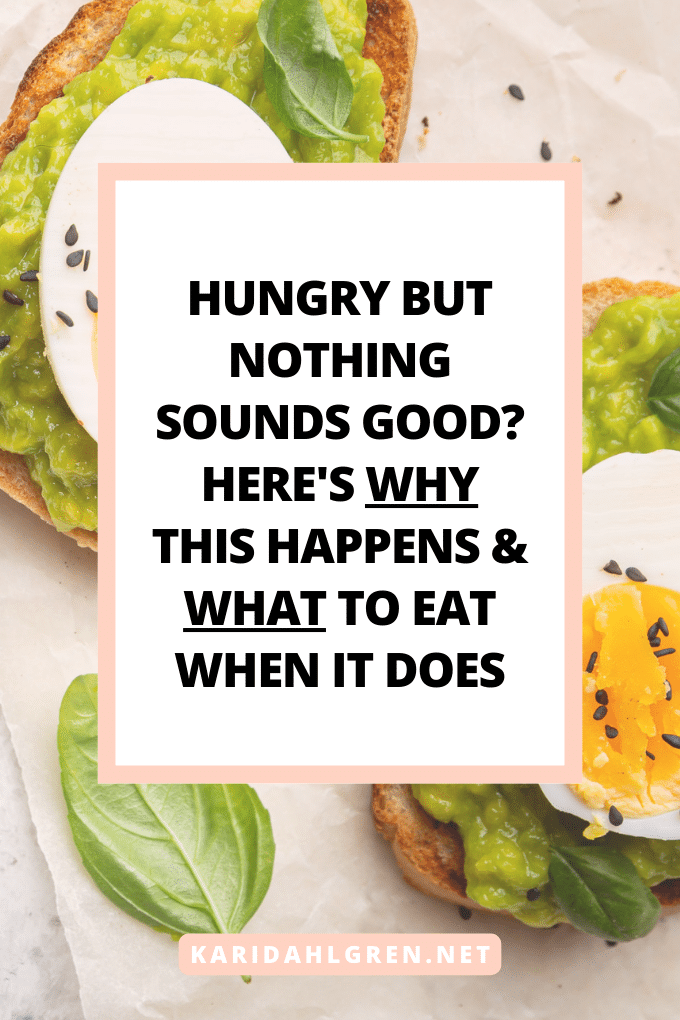
It’s dinnertime and you’re hungry but nothing sounds good. You open the fridge, close it. Open it, close it. You wander out of the kitchen, then wander back in. It’s an aimless feeling.
For this reason, let’s call it “Aimless Hunger” when you’re hungry but nothing sounds good. If your goal is to reach your natural weight or stop overeating, you might be tempted to skip a meal when you’re hungry but can’t decide what to eat.
But skipping a meal — especially when you’re hungry — usually leads to overeating later due to the well-documented restrict-binge cycle. It can also be counterproductive to your wellness goals. If you find yourself asking, “If I overeat one day should I undereat the next?” the answer is no — you always want to respect your body and honor its hunger and fullness signals.
This can lead to other burning questions such as, Why am I hungry but nothing sounds good? What should I eat when nothing sounds good? We all have unique needs and bodies, so the answer is different for everyone. Using the power of clinical studies, let’s explore different ways to address Aimless Hunger.
There will be plenty of ideas on what to eat when nothing sounds good about halfway through, so stay tuned!
Why Am I Hungry But Nothing Sounds Good? Evidence-Based Reasons
There are many different reasons why you might feel hungry with zero idea about what to eat, and some of them are positive reasons — like healing your metabolism after dieting and eating intuitively — while others may indicate an issue to address. Either way, it’s best to consult with your doctor or medical team if you’re concerned about consistently feeling hungry but nothing sounds good, especially over a long period of time.
Here are some positive reasons why you might struggle with feeling hungry while nothing sounds good:
- Connection to your hunger signals: When someone has a history of excessive dieting, it often mutes hunger signals and leads to confusion around what hunger feels like. If you’re hungry but nothing sounds good, it means you don’t have this problem. It means you’re connected to your hunger signals and you’re sensitive to the way your body feels (“interoceptive sensitivity”) — which is key for a healthy body and healthy relationship with food.[1]
- Ability to eat intuitively: Even if you don’t know what you want to eat when you’re hungry, acknowledging the feeling of hunger is a step in the right direction. Intuitive eating is linked to better body satisfaction, improved metabolic fitness, and improved mental health.[2] If you’re starting to get back in touch with your hunger signals, regardless of whether or not something sounds good, you’re on a well-trodden path towards wellness.
- Ability to prevent “hanger”: When you’re hungry, it means that your body is asking for fuel. When you listen to your body and eat when you’re hungry, even if nothing sounds good, you can prevent hunger from becoming extreme and causing “hanger,” the feeling of anger when hungry.[3]
The next time you find yourself wondering, Why am I hungry but nothing sounds good?, keep in mind that there are many good reasons for feeling Aimless Hunger. That said, it can also indicate a potential problem that needs to be addressed.
Here are more evidence-based reasons why you might feel hungry while nothing sounds good or appetizing:
- Eating the same foods too often: Variety is the spice of life. If you eat the same foods on repeat, you’re likely to find them less enjoyable.[4] The next time you’re hungry but nothing sounds good, reflect back on your last few weeks of eating. Have you been eating a variety of different and enjoyable foods? Satisfaction is an important part of eating.
- Too much dieting: Dieting causes a well-documented pattern of increased cravings, at least in the short term.[5], [6], [7] However, in the long-term, studies have found that dieting actually decreases food cravings.[8] If you’re hungry yet nothing sounds good, excessive dieting may have deconditioned your cravings, leading to Aimless Hunger.
- Nutrient deficiencies & “hidden hunger”: A deficiency of micronutrients (vitamins and minerals) can cause “hidden hunger,” which refers to a form of undernutrition caused by a diet low in nutrients but not calories. Studies show that even if you’re eating enough calories, a lack of micronutrients — particularly iron, zinc, iodine and vitamin A — can make you feel hungry anyway.[9]
- Stress: Whenever I’m hungry but nothing sounds good, stress is the first place I look because stress can suppress your appetite.[10] However, dieters tend to eat more when they are stressed, whereas unrestrained eaters tend to eat less under stress.[11] Depending on your relationship with food and history of dieting, stress can trigger a feeling of hunger while simultaneously feeling like nothing sounds good.
- Depression and anxiety: If you experience depression or anxiety and also struggle with feeling hungry while nothing sounds good, there could be a connection. Depression and anxiety have been found to decrease appetite.[12] Furthermore, many medications for psychiatric conditions can cause side effects that suppress the appetite, too. It’s important to talk to your doctor or therapist if you’re struggling with reduced interest in food because not eating enough (a potential symptom of a lackluster appetite) is strongly associated with anxiety and depression.[13]
- Potential medical conditions: Gastrointestinal disorders like gastritis, ulcers, or irritable bowel syndrome can cause nausea and discomfort — so much that, although you may feel hungry, you don’t feel like eating. Disorders such as thyroid problems, diabetes, or chronic kidney disease can also affect appetite and hunger. Eating disorders such as anorexia nervosa or bulimia can severely affect how individuals perceive hunger and appetite, too.[14]
As you can see, there are many reasons for experiencing hunger while simultaneously feeling like nothing sounds good. Some reasons are serious and require working alongside a healthcare professional, especially if you consistently struggle with feeling hungry while nothing sounds good over long periods of time.
Is It a Good Idea to Eat When Nothing Sounds Good?
Before we discuss what to eat when nothing sounds good, let’s quickly discuss something that often stands in the way: self-doubt. If you’re unsure about what to do when you feel Aimless Hunger, the answer is always to eat.
Whenever you are hungry, you should eat.
You’re not alone if you feel confused or even paralyzed by the self-doubting thought: Why am I hungry but nothing sounds good? Uncertainty sometimes indicates a lack of self-trust — a pattern fueled by diet culture.
Society praises and even advocates fad diets; and even the “doctor-recommended” regimen of Weight Watchers does not work long-term. When you participate in diets for too long, it trains you to rely on an external set of rules, which can ultimately diminish your self-trust and “interoceptive sensitivity” (aka, your ability to listen to your body).
Furthermore, when you begin to doubt yourself and your hunger, it can trigger a fear of weight gain. If this worries you, it’s important to know that undereating perpetuates Aimless Hunger by slowing your metabolism and increasing hormones that make you feel hungrier and less satisfied.[15] Whenever I’m hungry but nothing sounds good, I always try to eat because skipping a meal means I’m likely to overeat later.[16]
Whenever you’re hungry but can’t decide what to eat, aim to eat a simple balanced meal to nourish your body and promote a healthy metabolism. This begs the question, what should you eat when nothing sounds good? How can you reduce self-doubt while increasing self-trust around food?
What to Eat When Nothing Sounds Good
If you’re wondering what to eat when nothing sounds appetizing, first consider any potential medical conditions. When your medical history is complex, it’s best to work with a doctor or dietitian to decide what to eat when nothing sounds good.
For anyone that struggles with periodically feeling Aimless Hunger, I was surprised to find that the most robust source of ideas was Reddit, the so-called “front page of the internet.” Hundreds of people chimed in with their own ideas on what to eat when nothing sounds good, which I’ve summarized for you below.
Before we dive in, I’d like to share an excellent tip I learned from Redditors: it’s often helpful to focus on “breaking the seal.” Apparently, people who struggle with Aimless Hunger agree that getting yourself to eat something small will help “break the seal” and encourage you to eat more to fully satisfy your hunger. I thought that was brilliant.
Here are some ideas to help inspire you the next time you’re hungry but nothing sounds good:
1. Snack Prep Rather Than Meal Prep
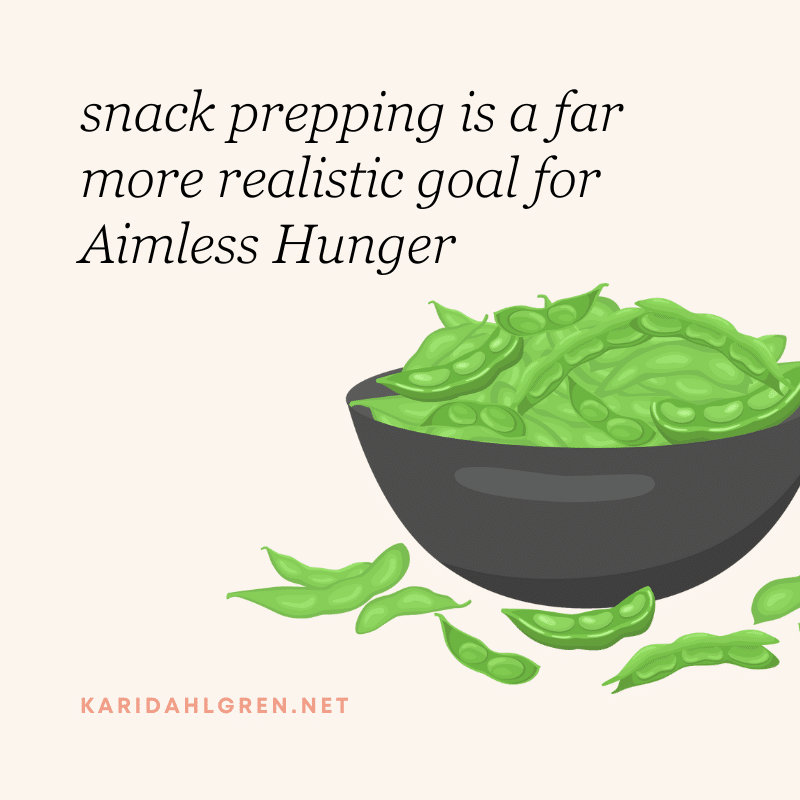
Have you ever felt hungry but can’t decide what to eat — possibly just because you’re low on energy? This lack of energy often leads to Aimless Hunger because cooking feels out of reach, especially when nothing seems appealing. In such moments, turn to no-cook meals to satisfy your hunger without the need for traditional meal prep.
Those who struggle with Aimless Hunger can lean into the pattern by “snack prepping” instead of meal prepping. This can help encourage you to eat a more robust and nutritious meal after you’ve had a snack.
Here are some snack ideas that you can prep ahead of time:
- Crackers, cheese, and charcuterie meat — “Adult Lunchables”
- Yogurt and granola
- Nut butter and fruit
- Rice cakes with toppings
- Guacamole with chips
- Chips with salsa
- Hard boiled eggs with salt
- Fruit and yogurt smoothies
- Grapes and cheese
- Edamame
- Popcorn
If you’re concerned about the nutritional value of these snack options, it’s important to remember that snacks are meant to be a bridge between meals, not complete meals themselves. They serve the purpose of satisfying immediate hunger and “breaking the seal” so that you continue to eat until you’re nourished and satisfied.
2. Simple, Nutritious Food Pairings
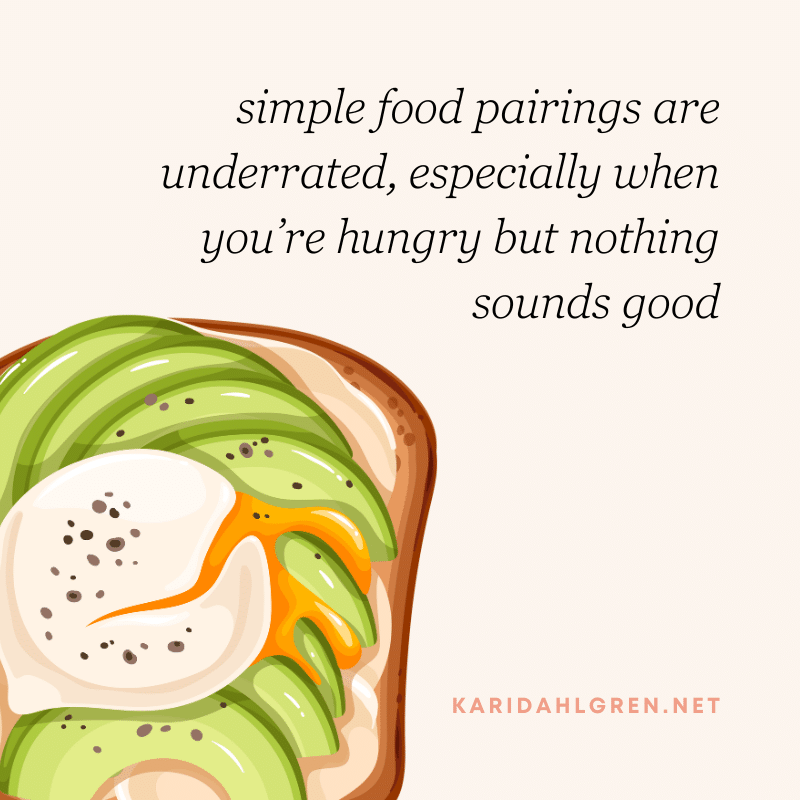
If you’re feeling up to making a light meal but nothing sounds good, consider leaning on classic and reliable food combinations. Tried-and-true food pairings are not only simple to prepare but are also known for their satisfying flavors, which can help you get into motion the next time you’re hungry but nothing sounds good.
Here are some simple and popular food pairings:
- Soup and toast
- Cereal and banana
- Sandwich and salad
- Oatmeal with almonds
- Scrambled eggs with toast
- Salad with chicken
- Pasta and tomato sauce
- Rice and beans
When you have the energy to prepare a meal but can’t decide what to eat because nothing sounds good, rely on classic and familiar food pairings to satisfy your hunger. However, this strategy might not be effective if your lack of interest in food is due to having the same meals too often. In that case, seek variety the next time you’re wondering what to eat when nothing sounds good.
3. Fresh Fruits and Veggies
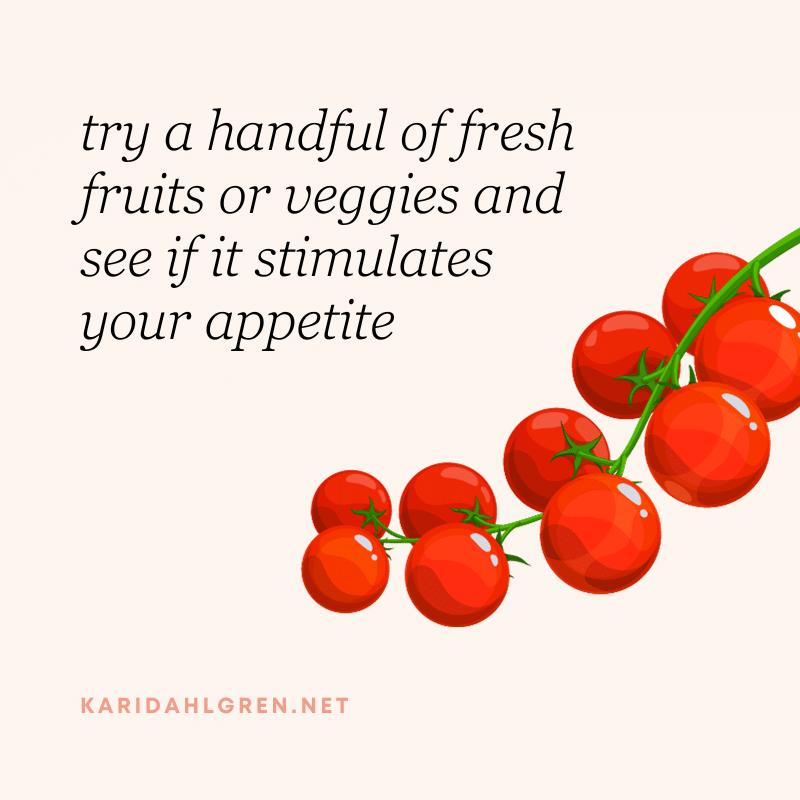
Incorporating fresh fruits and vegetables into your diet can be a refreshing and easy way to satisfy your hunger when you can’t decide what to eat. These natural, nutrient-rich options are not only healthy but also require minimal preparation.
Ideas for incorporating fresh fruits and veggies:
- Any fruit in-season or on-hand
- Veggie sticks with dip
- Cherry tomatoes with olive oil and vinegar
- Berries with a dollop of whipped cream
- Apple slices with nut butter
- Simple green salad with vinaigrette
Fresh fruits and vegetables are a convenient choice when you’re hungry but nothing sounds good, offering a burst of natural flavors to inspire your appetite.
4. No Cook Meals
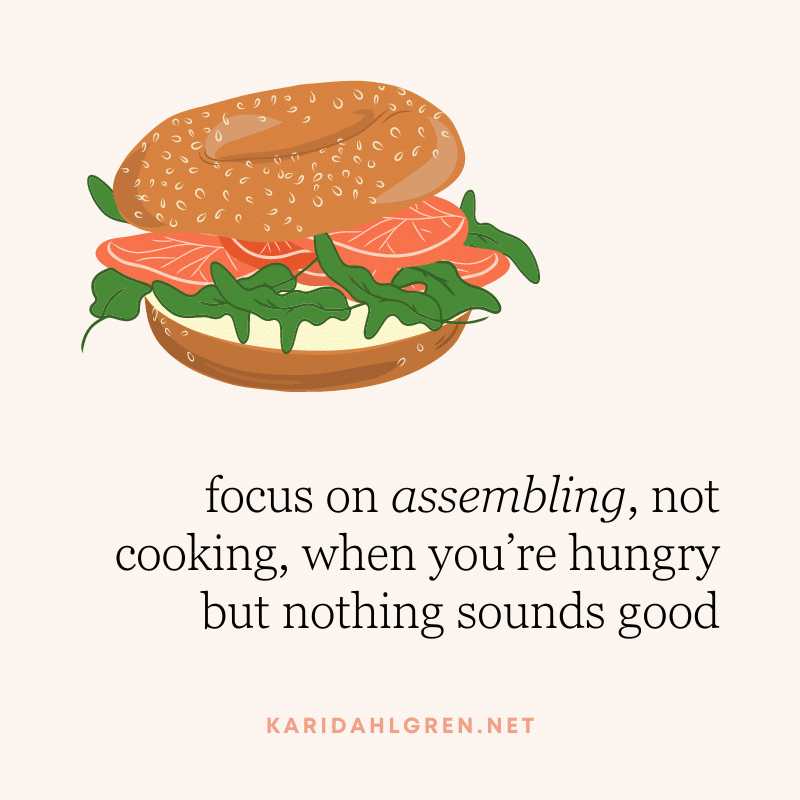
No-cook meals are a fantastic option for those times when you want something more than a snack but nothing sounds quite appetizing. No-cook meals are all about assembling rather than cooking, focusing on ingredients that are ready to eat as they are.
Here are some no-cook meal ideas:
- Sandwiches with deli meats, cheese, and fresh veggies
- Wraps filled with canned tuna or chicken, lettuce, and avocado
- Overnight oats with milk, chia seeds, and fruits
- Caprese salad with fresh tomatoes, mozzarella, basil, and balsamic glaze
- Cold pasta salad with cherry tomatoes, olives, feta cheese, and cucumber
- Smoked salmon with cream cheese and bagels
Whenever I’m hungry but nothing sounds good, I’m usually stressed, which zaps my energy. Anything that requires cooking is out of the question, and I have become a big fan of assembling over cooking. If you’re like me and tend to procrastinate on meal prepping, maybe you can opt for snack prepping and no-cook meal prepping (i.e. grocery shopping and leaving it at that).
5. New Cuisines and Flavors
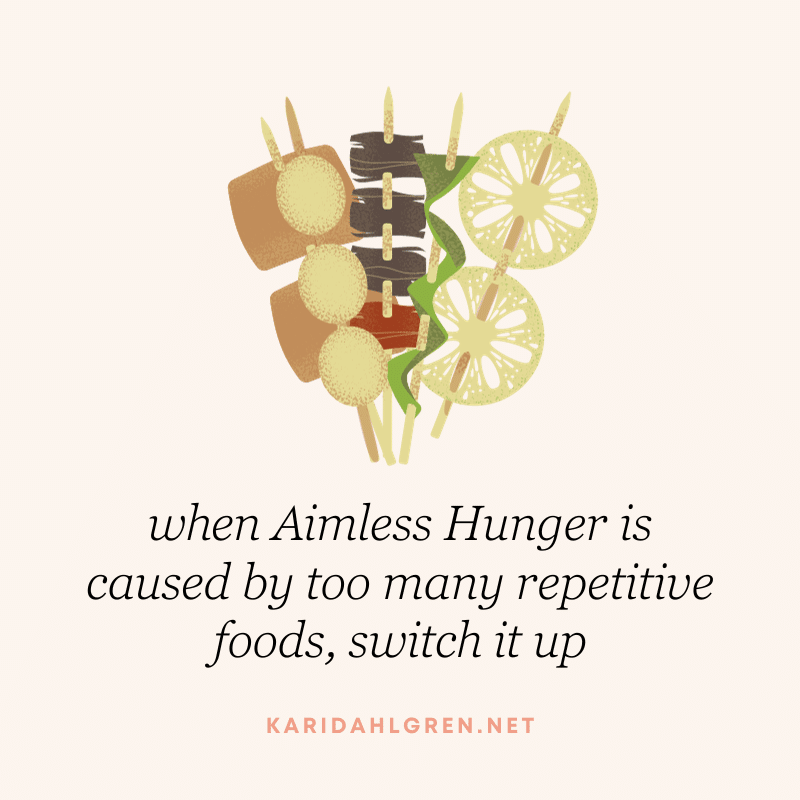
Previously, we explored the idea that a lack of diversity in your diet can lead to Aimless Hunger. When you find yourself feeling hungry yet uninspired by your usual food choices, it might be time to delve into vibrant, new flavors that can awaken and invigorate your palate.
Here are some ideas for exploring new cuisines and flavors:
- Japanese sushi rolls
- Lebanese hummus platter
- Thai noodle dishes like pad see ew
- Indian curries
- Mexican tacos
- Vietnamese pho
- Spanish empanadas
- Korean bibimbap
- Vietnamese pho
Experimenting with new cuisines can be a fun and engaging way to discover new favorite dishes and stimulate your appetite when you’re hungry but nothing sounds good. Of course, if you don’t have the energy to go out and purchase all the ingredients and then come home and cook, delivery is the next best thing.
6. Comfort Foods
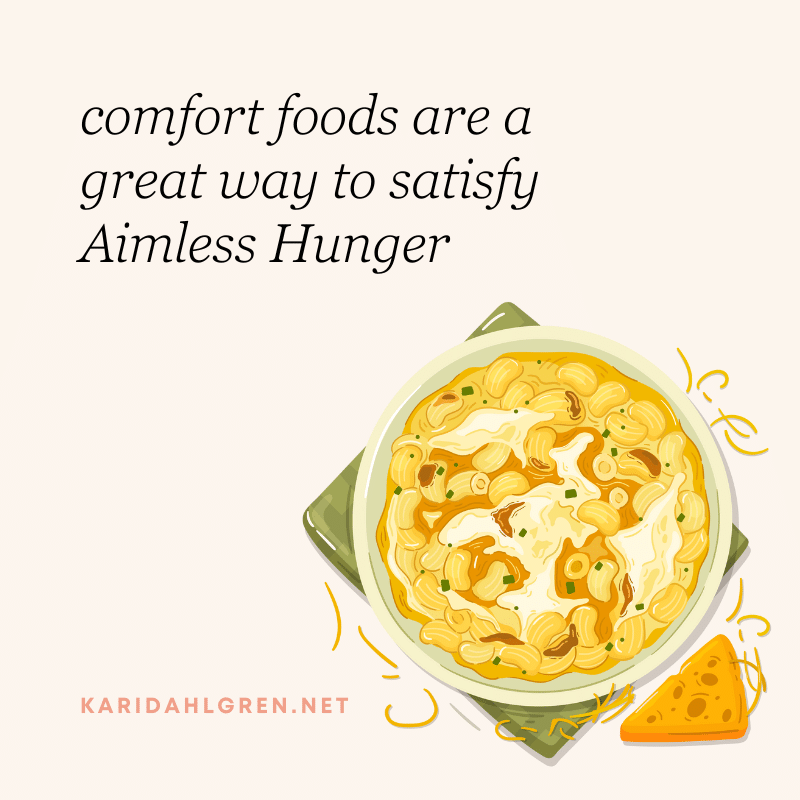
While it may sound strange to suggest eating comfort foods when you’re experiencing Aimless Hunger, it can often satisfy both physical and emotional hunger. Even though we established that Aimless Hunger is purely physical hunger, comfort foods can provide some added joy.
This can decrease the likelihood of turning to food for joy later (something known as hedonic eating).
Here are some comfort foods ideas:
- Tomato soup with grilled cheese
- Box macaroni and cheese
- Mashed potatoes with gravy
- Baked beans on toast
- Spaghetti with meatballs
- Chicken noodle soup
- Instant ramen with extra add-ins
Comfort foods offer familiarity and are likely to satisfy your hunger, even when nothing else seems appealing. Of course, it is worth acknowledging that for those who struggle with overeating, the concept of comfort food can trigger anxiety or a fear of potential weight gain.
It’s common to worry that once you start eating comfort foods, you might not stop at a reasonable portion, and instead find yourself going for seconds or even thirds. Here, introducing the Stop, Drop, & Feel method can help curb the desire to eat once you aren’t hungry anymore.
Although it may sound straightforward to “feel your feelings” instead of reaching for food, the process is often more difficult and complex than it seems. For instance, some people may not know that an emotion is behind the desire to overeat, so they may write sugar cravings off as mere sugar addiction even though some clinical studies find little evidence in support of it.[17]
Mastering Aimless Hunger: What to Do When Nothing Sounds Good to Eat
Facing Aimless Hunger can be a perplexing and sometimes frustrating experience. However, it’s important to remember that it’s a normal, human experience and it doesn’t have to be a source of stress or self-doubt.
Whether your hunger arises from a lack of variety in your diet, the damaging impact of excessive dieting, or emotional factors, there’s always a pathway to understanding and addressing feeling hungry while nothing sounds good. The key is to listen to your body and respond with kindness and curiosity.
To learn more about developing a natural, intuitive approach to eating, check out my free ebook below. It comes with a free 5-day course in my personal philosophy on stopping compulsive eating: Psycho-Spiritual Wellness.

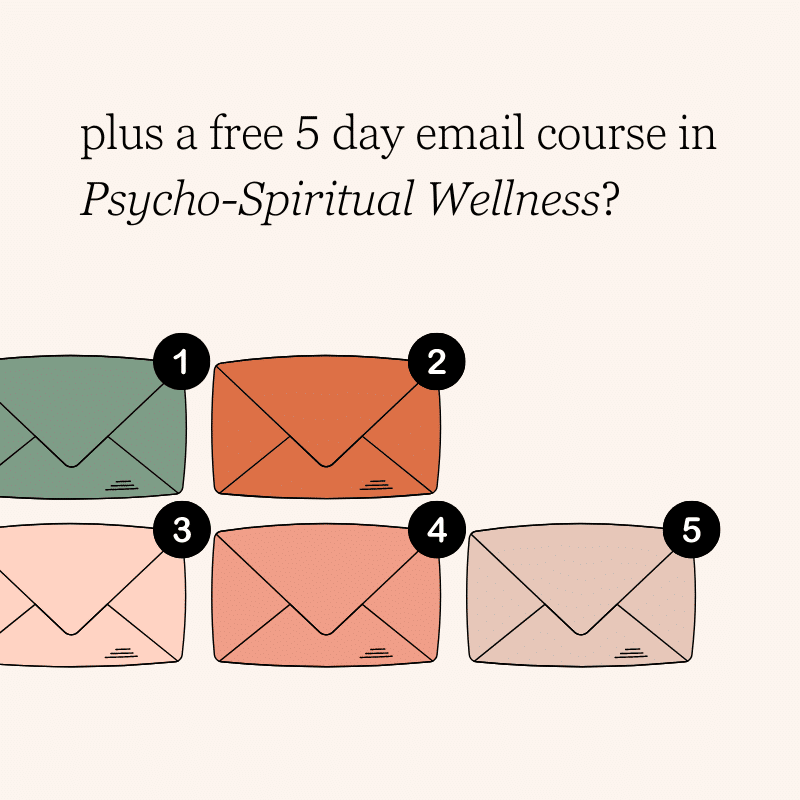
![best seller [cover of Why We Do the Things We Do]](https://karidahlgren-net.b-cdn.net/wp-content/uploads/2023/09/why-we-do-the-things-we-do-1.png)
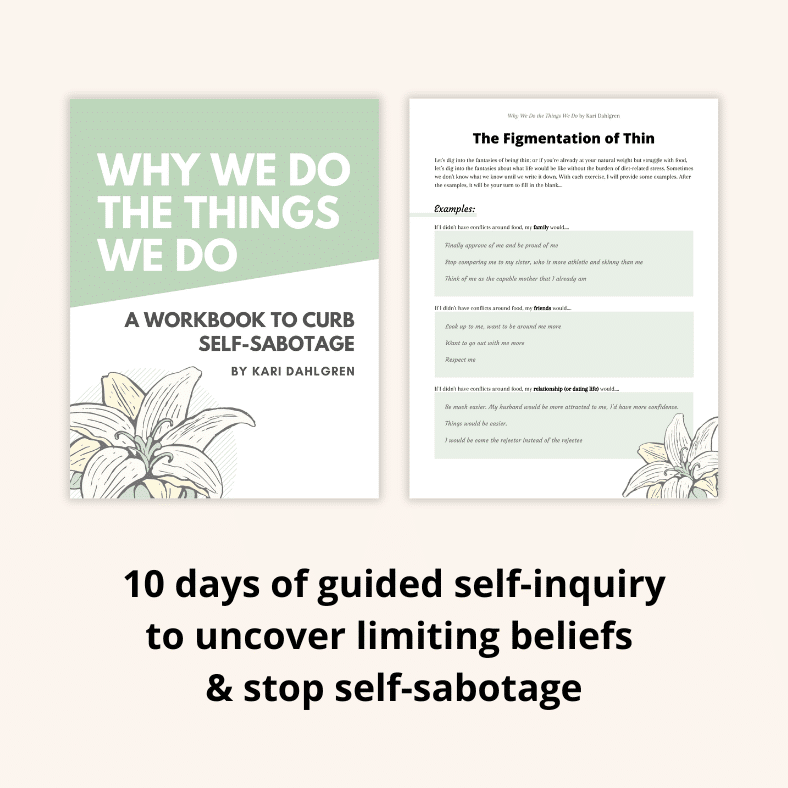
This doesn’t really help. Its 6pm. Ive been awake since 8am. Haven’t eaten a single thing. Im starving but whatever I think about eating makes me wanna throw up. Nothing sounds good, literally.
I definitely recommend seeing a doctor, Dee. Nausea is a serious issue and if you aren’t eating you could develop serious health issues. I hope a medical professional is able to help you solve the nausea issue! I’m so sorry to hear that you’re struggling with it.
I understand that, Dee!